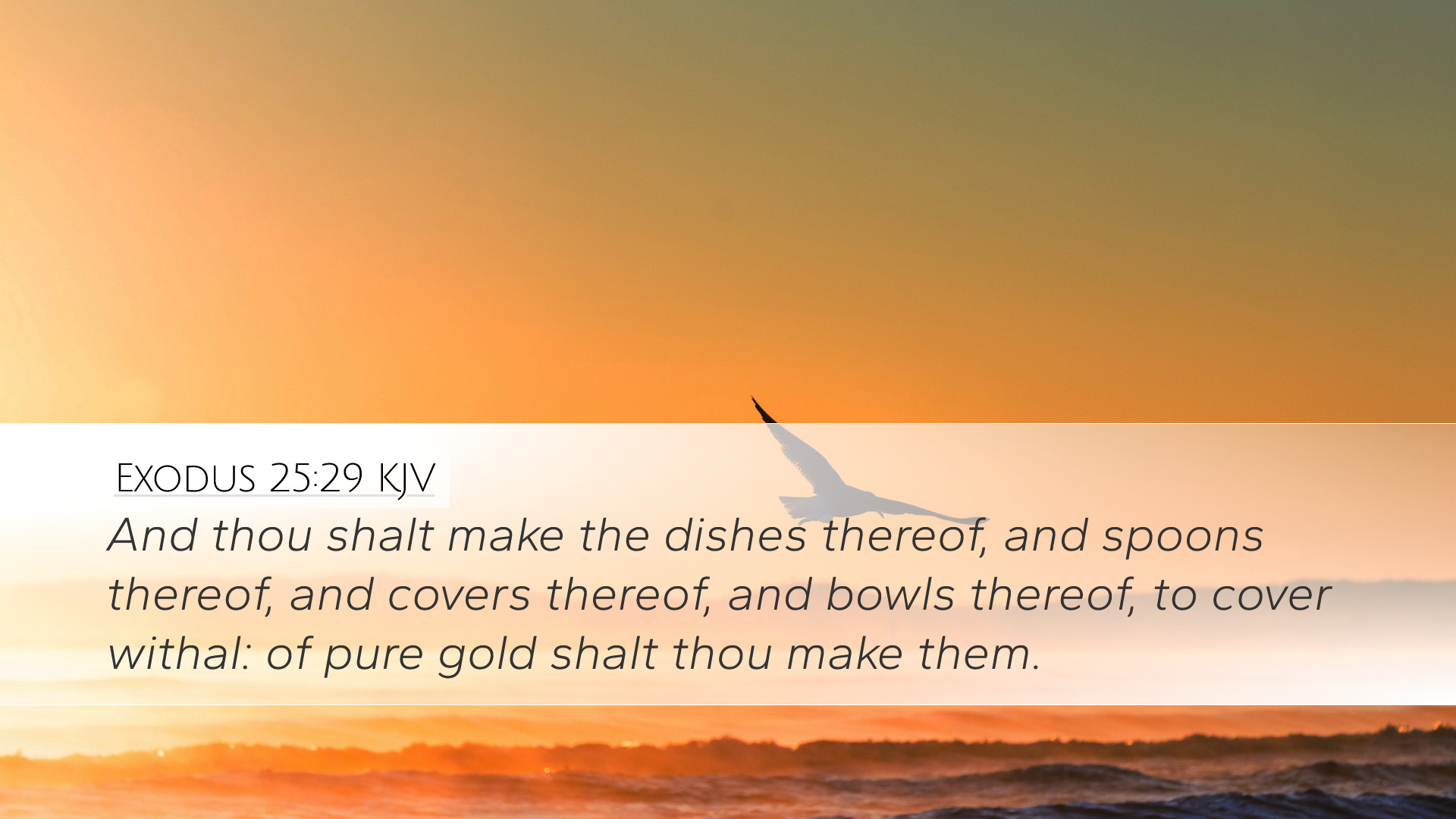Exodus 25:29 Commentary
Text of Exodus 25:29 (KJV): "And thou shalt make the dishes thereof, and spoons thereof, and covers thereof, and bowls thereof, to cover withal: of pure gold shalt thou make them."
Introduction
The instruction provided in Exodus 25:29 is a part of God's detailed directives to Moses regarding the construction of the Tabernacle and its furnishings. This verse emphasizes the sacredness and beauty expected in the things that pertain to worship. The focus here remains on the significance of the articles intended for temple service, particularly those made of pure gold.
Understanding the Context
In the preceding chapters, God outlines the specifications for the Tabernacle and its furnishings. The setting of these instructions reveals God's desire for an orderly and aesthetically pleasing environment for worship. Matthew Henry remarks that every object in the Tabernacle serves a dual purpose: to fulfill practical needs and to glorify God.
Albert Barnes brings to light that the materials used in these instruments—primarily gold—signify the value and sanctity of the service rendered unto the Lord. Such materials were not mere decor; they represented the people’s reverence towards God.
The Significance of the Articles
- Dishes: Used for serving offerings, they reflect the hospitality of God's provision.
- Spoons: These instruments convey the idea of precision in the sacrificial rites, showing that God is particular about the details of worship.
- Covers: They suggest an element of sacredness, shielding the holy objects and maintaining the sanctity of the worship environment.
- Bowls: Much like dishes, the bowls serve as vessels for offerings, paralleling the concept of divine abundance and the congregation’s response.
Adam Clarke indicates that these items were crafted from pure gold, symbolizing the glory of God and the value placed on worship. Gold, often recognized as a symbol of purity and divinity, underscores the need for holiness in the objects used in divine service.
Theological Implications
From a theological standpoint, the materials and the meticulous nature of the preparations reflect God's covenant with His people. It is indicative of the relationship between the divine and humanity where God desires both intimacy and holiness. The use of gold is emblematic of heaven's splendor, a theme echoed throughout Scripture.
As Henry stipulates, these instructions are not just historical accounts; they symbolize the profound relationship between God and His people. Just as the gold was carefully crafted into sacred objects, the hearts of believers are to be crafted for divine service, highlighting the call to holiness.
Practical Applications
For pastors and church leaders, Exodus 25:29 calls for an evaluation of how worship is approached in their communities. Are the elements of worship treated with respect? Are they reflective of the glory and holiness of God?
Students and scholars may glean a lesson about the importance of details in divine service. Just as God provided clear directions for the construction of His dwelling, so too does He provide guidance for the conduct of worship today. This verse invites reflection on how modern practices align with biblical principles.
The emphasis on using materials of value also serves as a reminder that worship should be offered from the heart—whatever we bring must be genuine and reflect our utmost reverence for God.
Conclusion
Exodus 25:29 presents both a historical account of the artifacts of the Tabernacle and a theological foundation for understanding how worship should be approached. The instructions regarding the golden dishes, spoons, covers, and bowls encompass God's desire for beauty, holiness, and meticulousness in sacred worship. Pastors, theologians, and students of the Bible are encouraged to delve into this verse not just for its historical significance but for its timeless application in worship and service to the Lord.


